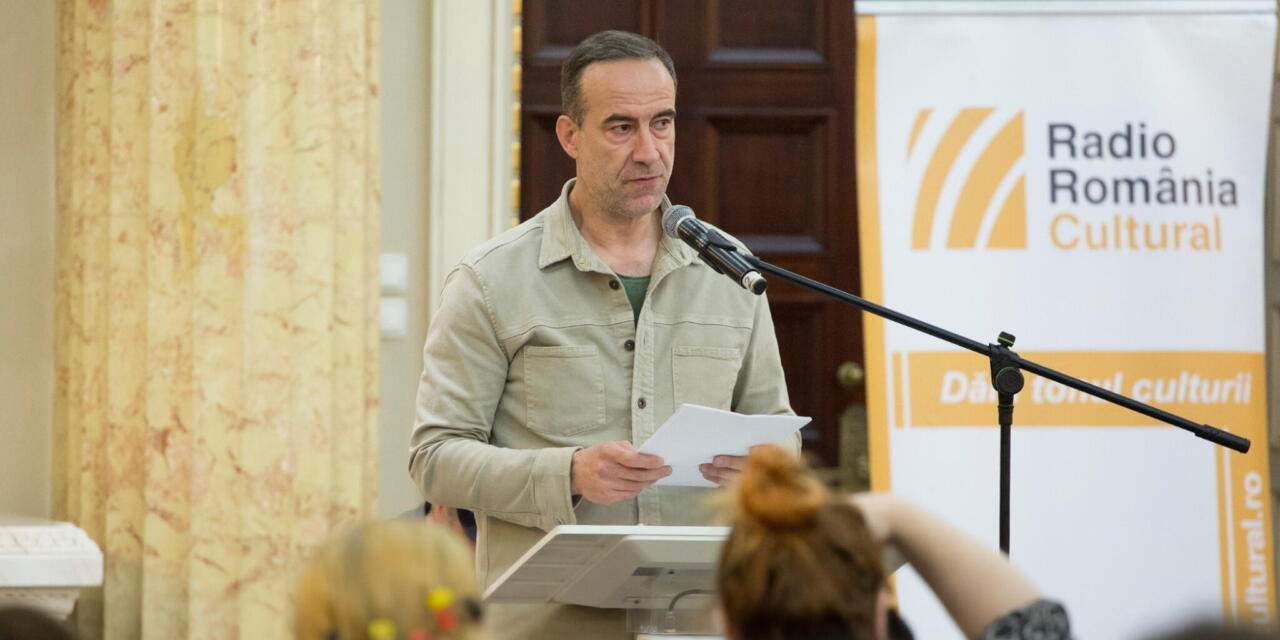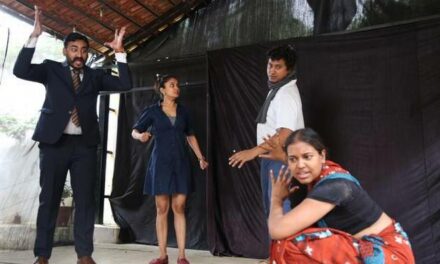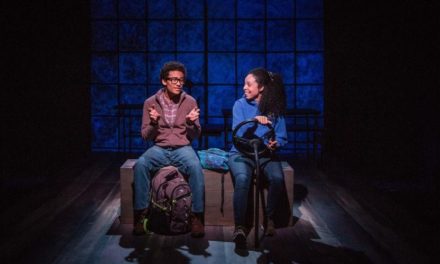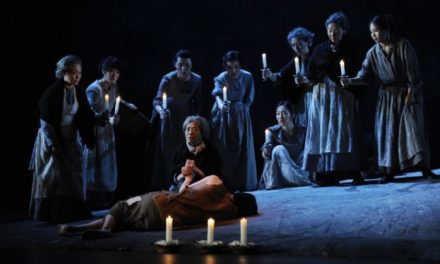Andriy Bondarenko is the dramaturg of the Puppet Theater in Lviv, Ukraine, where he lives, but he is also a co-founder of the Kyiv Theater of Playwrights, and the author of the dramatic poem Survivor’s Syndrome, the Romanian translation of which premiered on Saturday, May 14, 2022, at the National Museum of Art of Romania in Bucharest. It was streamed live on Radio România Cultural as the initial event in the Romanian Artists for Ukrainian Artists campaign initiated by journalist, theater translator and curator Raluca Rădulescu, and organized and coordinated by UNITER, a non-profit, independent association of theatermakers in Romania. By the time it is completed in June, the program will be joined by approximately 50 public and independent theaters from all over Romania and the Republic of Moldova, as well as museums and Radio România Cultural. The premiere reading of Survivor’s Syndrome was performed by Șerban Pavlu. Bondarenko’s poetic monologue is one of 15 texts commissioned by Philip Arnoult’s International Center for Research and Theater for the Worldwide Ukrainian Play Reading Project. Prior to the stream, The playwright spoke with Raluca Rădulescu in an exclusive interview broadcast May 13 on Rădulescu’s radio program, Scena şi ecranul.
Raluca Rădulescu: What was it like for you, writing this text in March, right at the beginning of the war in Ukraine, during that initial period of shock?
Andriy Bondarenko: Those first days of the war were very hard. Many colleagues told me it was a difficult time for them to write. For me it was just the opposite. I don’t know why. I just felt like I had to write, and that I could write, and that really helped me withstand the shock and the horror of the situation we were in. Writing helped me find myself, and find the strength to resist, and move on. But I think it’s very personal and it depends on each individual. Writing helped me personally.
RR: So is writing a wartime therapy?
AB: Yes. Something like that. I wrote with the feeling that those words were repeating over and over in my head. There were constant bombings, and I kept switching back from one state to another – I was full of hope, I was full of despair. But there were always words in my head, words that I then put on paper. And yes, they worked for me as therapy. It wasn’t like that for everyone. I know other playwrights who couldn’t write a thing, they were struggling with writer’s block…
RR: Did the themes for what you wrote also came naturally?
AB: I didn’t spend much time choosing. It wasn’t like usual when I do my homework, I think about what I’ll write, I make sketches of ideas and plans. In this case the homework was all around me, it was in my head, and all I had to do was listen to it, and give it a voice.
RR: I would call Survivor’s Syndrome a dramatic poem. Did it come naturally?
AB: Yes. It is written like a poem. I chose this form because all the words written there are an expression of conscience for me. As I said, they kept repeating in my mind, and all I did was listen to them and write them down. The form came naturally, because those words in my head flowed onto paper like a river stream. I wanted it to be clear that this was not an ordinary prose or dramatic text, it was the expression of what I was experiencing. It came to me as it did.
RR: When you were writing, all of your writers in the Theater of Playwrights knew that your texts would be translated and mounted as readings all over the world. Did this influence your creative method in any way?
AB: Yes, I knew that the texts we were writing would be part of John Freedman’s Worldwide Ukrainian Play Reading Project, but at that moment in time, neither I nor my colleagues were fully aware of just what would happen to our texts. All we knew was that John had asked us to write texts about our war-torn lives. I didn’t spend much time thinking about the purpose, where they would be read, or for what audience. I just held in my head the thought that John had asked us to write something, and that probably the audiences would be foreign. And, yes, I probably thought that I would like to tell people outside of Ukraine how the war felt here. But something very personal also remained. It was like talking to myself. At that time, at the end of February, beginning of March, we were all in a state of shock. It was hard for us to think normally.
RR: And now?
AB: Now we are trying to get back to a somewhat normal life. At least insofar as life can be normal in wartime. I live in Lviv in Western Ukraine, and it’s more or less quiet here. A few bombs exploded here, but not as many as in Odesa, for example. There are very different situations for different people. I am lucky to have been able to remain in my city. I was not among those who had to evacuate. But I have friends who were forced to leave the cities where they lived, Kharkiv or Kyiv, for example. Many of them came to Lviv, or went to Poland or Germany. But even in my case, although I stayed at home, to say nothing of all of us in general, the situation is terrible, very harsh things are happening. The war continues, and it is an extremely brutal and horrible war. I can’t help but think about it all the time, it’s always with me and beside me. It’s like a black hole that stays next to me. All my thoughts are drawn to it. But even so, here in Lviv, in the theater where I work, we try to continue working so that people can go to the theater. I really feel the need to participate in cultural events, to feel that I am still alive and can continue my life. I think my need to go to concerts or something is even greater now than before the war began.
RR: I know that schools in many areas of Ukraine are closed and online. Are children coming to the theater?
AB: Yes. Kids are coming, but our audience has changed. Our usual spectators at the Puppet Theater in Lviv were mothers with children. Now, however, they have gone to other countries, to Western Europe, and we have other spectators coming to us from cities in Eastern Ukraine. They love to come to the theater, so our audiences are as big as ever, it’s just that now there are many kids from other cities.
RR: Andriy, I would like to ask you about the role of the artist and of theater in Lviv during the war.
AB: I think theater now, in wartime, has many functions. For example, we must make our situation heard and known throughout the world, precisely as we’re doing with the Worldwide Ukrainian Play Reading Project. I think that’s extremely important. It is also important because, before, the voices of Ukrainian artists were overshadowed by Russian voices. No one perceived us as Ukrainians, but rather through the lens of Russians. Now we’re starting to make our own voices heard in theater and I think that helps us a lot. Really a lot. Theater is also very important now because it gives people the feeling that they are not alone. We ourselves did staged readings here in Lviv with these texts that were written after February 24, 2022, and that was followed by a discussion with the audience. One spectator told us that, as he listened to our words, he began to understand that everyone has the same feelings as he does, and that that helped him not to feel so alone anymore. I believe that theater gives us the opportunity to express how we feel and what we are experiencing now, and I think it is very important that we share these things. Theater is an important means by which we can do this. These readings taking place all over the world are very important to me because I feel I am no longer alone in the face of these devastating atrocities that the Russians have committed in my country. It’s very easy to fall into despair. But since we know how many people have come together in this project, and how many people are involved in it, it helps us not to feel alone. It gives us more strength.
RR: Survivor’s Syndrome by Andriy Bondarenko will be read on Radio Romania Cultural and then in numerous theaters throughout Romania. Do you have a message for the Romanian audience?
AB: I am very happy that Romanians will hear my text, because Romania is one of our great neighbors. Romania has helped us a great deal in this war. It has taken in many Ukrainian refugees and we have heard many stories about how well Romanians have received Ukrainian refugees. I also have some good friends in Romania and I am pleased to imagine that they will hear my text, and it will be a sign for them that I am alive, well and writing. Because they often ask me what I am doing, and how I feel. I know they care about me. They have encouraged me a lot since the war began, so I’m glad to show them I am good at what I write. And I would like to thank all of you – you personally, Radio Romania Cultural, the organizers of this campaign, and the listeners, because you have shown us that you care.
Andriy Bondarenko is a Doctor of Philosophy, playwright, journalist and historian of culture. His plays have appeared in shortlists of the Ukrainian festivals Contemporary Play Week, Drama.UA, and the Love and Beaver Festival of Drama. Andrii is a founding member of Kyiv’s Theatre of Playwrights. He is the head of the literary and dramatic department (dramaturg) of the Lviv Puppet Theater.
Raluca Rădulescu is a theatre journalist, translator and curator, and holds a Ph.D. in Philology from the University of Bucharest. She has worked for National Romanian Radio since 1999. Her program Scena şi ecranul (Stage and Screen), on Radio România Cultural, is the only daily show about theatre and film broadcast on FM in Romania. She has translated numerous books and plays from Russian into Romanian.
Translated by John Freedman
This post was written by the author in their personal capacity.The opinions expressed in this article are the author’s own and do not reflect the view of The Theatre Times, their staff or collaborators.
This post was written by Raluca Rădulescu.
The views expressed here belong to the author and do not necessarily reflect our views and opinions.


















